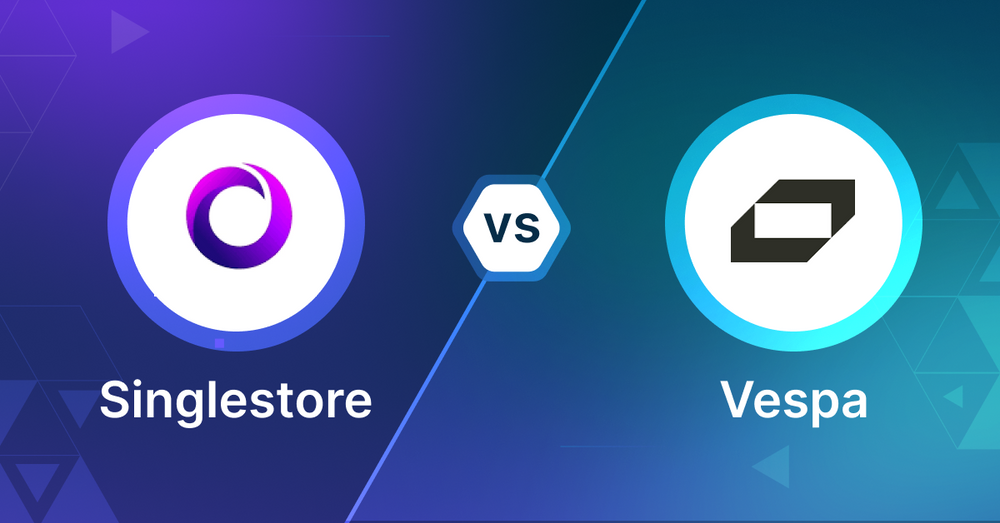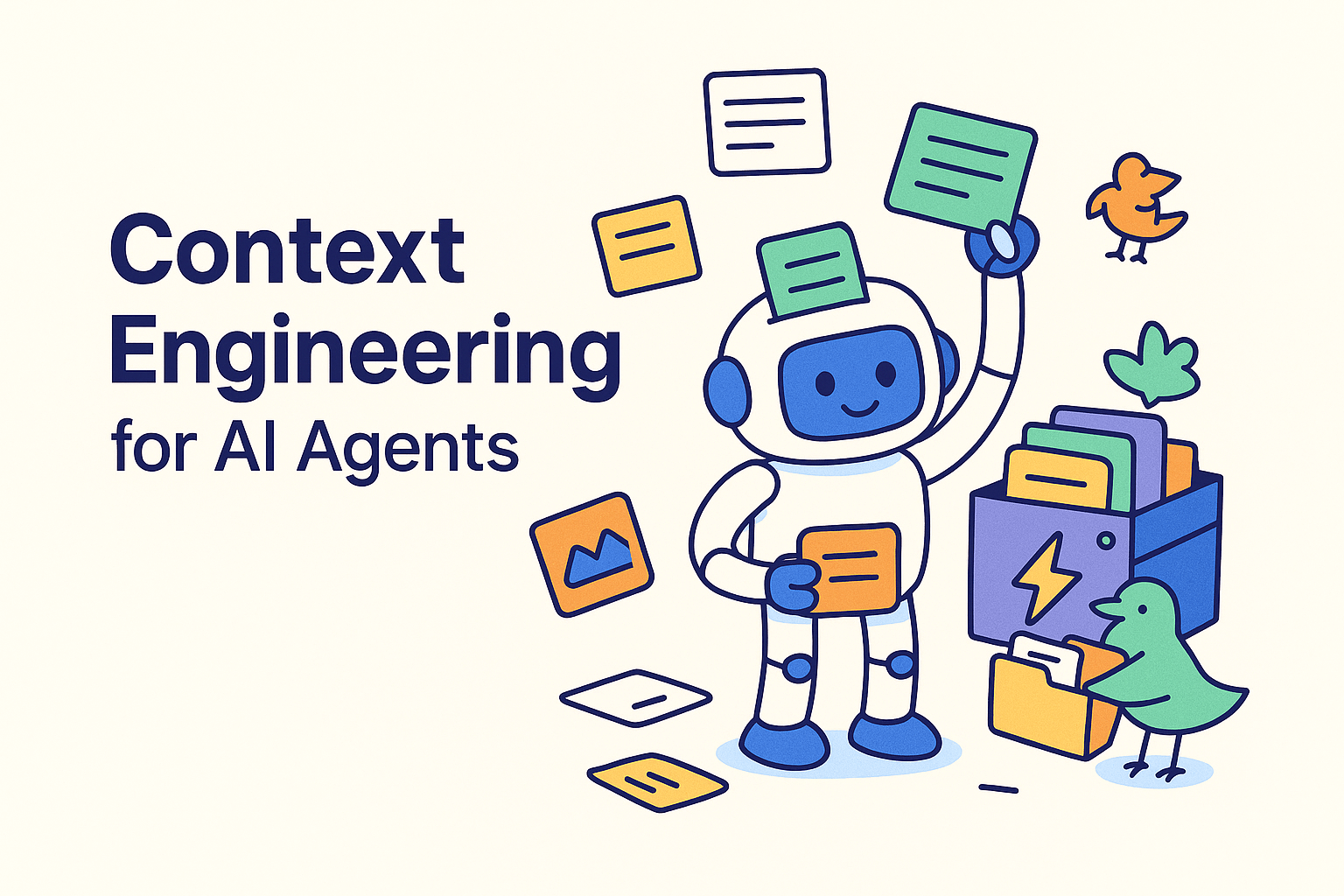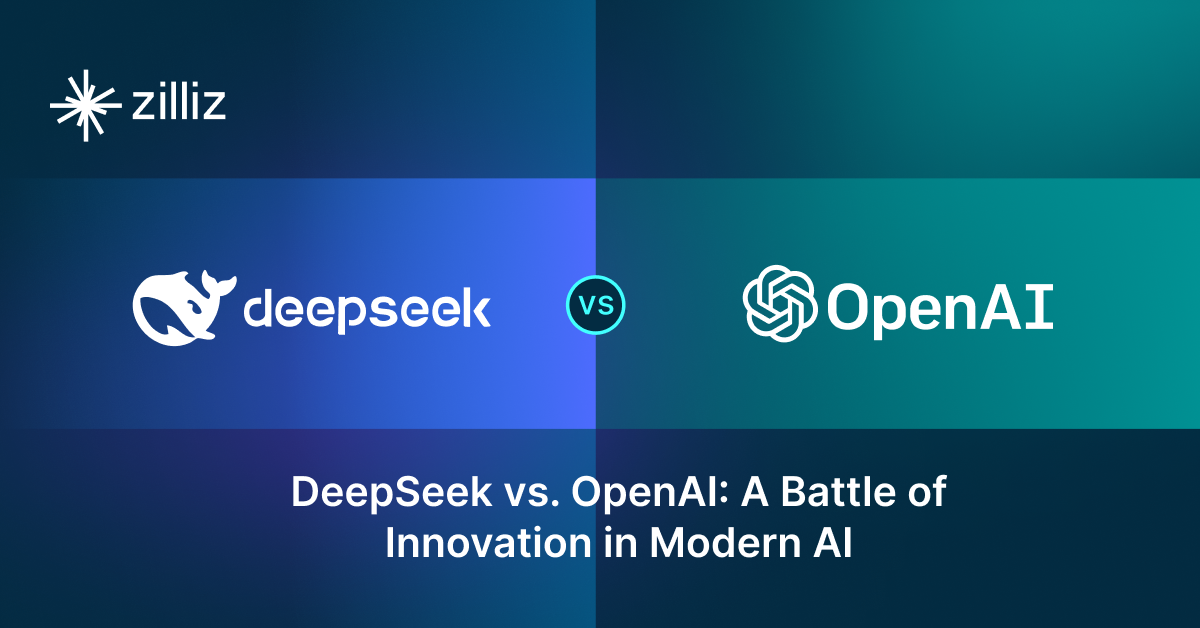SingleStore vs Vespa Choosing the Right Vector Database for Your AI Apps

What is a Vector Database?
Before we compare SingleStore and Vespa, let's first explore the concept of vector databases.
A vector database is specifically designed to store and query high-dimensional vectors, which are numerical representations of unstructured data. These vectors encode complex information, such as the semantic meaning of text, the visual features of images, or product attributes. By enabling efficient similarity searches, vector databases play a pivotal role in AI applications, allowing for more advanced data analysis and retrieval.
Common use cases for vector databases include e-commerce product recommendations, content discovery platforms, anomaly detection in cybersecurity, medical image analysis, and natural language processing (NLP) tasks. They also play a crucial role in Retrieval Augmented Generation (RAG), a technique that enhances the performance of large language models (LLMs) by providing external knowledge to reduce issues like AI hallucinations.
There are many types of vector databases available in the market, including:
- Purpose-built vector databases such as Milvus, Zilliz Cloud (fully managed Milvus)
- Vector search libraries such as Faiss and Annoy.
- Lightweight vector databases such as Chroma and Milvus Lite.
- Traditional databases with vector search add-ons capable of performing small-scale vector searches.
SingleStore is a distributed, relational, SQL database management system with vector search as an add-on and Vespa is a purpose-built vector database. This post compares their vector search capabilities.
SingleStore: Overview and Core Technology
SingleStore has made vector search possible by putting it in the database itself, so you don’t need separate vector databases in your tech stack. Vectors can be stored in regular database tables and searched with standard SQL queries. For example, you can search similar product images while filtering by price range or explore document embeddings while limiting results to specific departments. The system supports both semantic search using FLAT, IVF_FLAT, IVF_PQ, IVF_PQFS, HNSW_FLAT, and HNSW_PQ for vector index and dot product and Euclidean distance for similarity matching. This is super useful for applications like recommendation systems, image recognition and AI chatbots where similarity matching is fast.
At its core SingleStore is built for performance and scale. The database distributes the data across multiple nodes so you can handle large scale vector data operations. As your data grows you can just add more nodes and you’re good to go. The query processor can combine vector search with SQL operations so you don’t need to make multiple separate queries. Unlike vector only databases SingleStore gives you these capabilities as part of a full database so you can build AI features without managing multiple systems or dealing with complex data transfers.
For vector indexing SingleStore has two options. The first is exact k-nearest neighbors (kNN) search which finds the exact set of k nearest neighbors for a query vector. But for very large datasets or high concurrency SingleStore also supports Approximate Nearest Neighbor (ANN) search using vector indexing. ANN search can find k near neighbors much faster than exact kNN search sometimes by orders of magnitude. There’s a trade off between speed and accuracy - ANN is faster but may not return the exact set of k nearest neighbors. For applications with billions of vectors that need interactive response times and don’t need absolute precision ANN search is the way to go.
The technical implementation of vector indices in SingleStore has specific requirements. These indices can only be created on columnstore tables and must be created on a single column that stores the vector data. The system currently supports Vector Type(dimensions[, F32]) format, F32 is the only supported element type. This structured approach makes SingleStore great for applications like semantic search using vectors from large language models, retrieval-augmented generation (RAG) for focused text generation and image matching based on vector embeddings. By combining these with traditional database features SingleStore allows developers to build complex AI applications using SQL syntax while maintaining performance and scale.
Vespa: Overview and Core Technology
Vespa is a powerful search engine and vector database that can handle multiple types of searches all at once. It's great at vector search, text search, and searching through structured data. This means you can use it to find similar items (like images or products), search for specific words in text, and filter results based on things like dates or numbers - all in one go. Vespa is flexible and can work with different types of data, from simple numbers to complex structures.
One of Vespa's standout features is its ability to do vector search. You can add any number of vector fields to your documents, and Vespa will search through them quickly. It can even handle special types of vectors called tensors, which are useful for representing things like multi-part document embeddings. Vespa is smart about how it stores and searches these vectors, so it can handle really large amounts of data without slowing down.
Vespa is built to be super fast and efficient. It uses its own special engine written in C++ to manage memory and do searches, which helps it perform well even when dealing with complex queries and lots of data. It's designed to keep working smoothly even when you're adding new data or handling a lot of searches at the same time. This makes it great for big, real-world applications that need to handle a lot of traffic and data.
Another cool thing about Vespa is that it can automatically scale up to handle more data or traffic. You can add more computers to your Vespa setup, and it will automatically spread the work across them. This means your search system can grow as your needs grow, without you having to do a lot of complicated setup. Vespa can even adjust itself automatically to handle changes in how much data or traffic you have, which can help save on costs. This makes it a great choice for businesses that need a search system that can grow with them over time.
Key Differences
Search Methodology and Capabilities
SingleStore does vector search directly in the database engine and offers both exact k-nearest neighbors (kNN) and Approximate Nearest Neighbor (ANN) search. It supports multiple index types: FLAT, IVF_FLAT, IVF_PQ, IVF_PQFS, HNSW_FLAT, HNSW_PQ and dot product and Euclidean distance for similarity matching.
Vespa does vector search + text search + structured data queries in one engine. This unified search allows developers to do multiple types of searches at once, which can be very useful for complex applications.
Data Handling and Storage
SingleStore is a full database system, vectors are stored in regular database tables. Currently, it supports the Vector Type(dimensions[, F32]) format, F32 is the only supported element type. Vectors must be stored in columnstore tables, with indices created on single columns containing vector data.
Vespa has more flexibility in data representation, you can have any number of vector fields per document. It can handle tensors, so it’s suitable for complex data structures like multi-part document embeddings. This flexibility extends to handling data types beyond just vectors.
Scalability and Performance
Both systems do scalability differently:
SingleStore has a distributed architecture where data is spread across multiple nodes. As data grows, you add more nodes and capacity increases. The query processor combines vector search with SQL operations, no need for separate queries.
Vespa has a C++ engine for memory management and search operations. It distributes workloads across nodes and adjusts to changing data volume or traffic patterns. This auto-scaling helps to optimize resource usage and potentially reduce costs.
Integration and Usage
SingleStore does vector search in standard SQL syntax, so developers familiar with SQL can use it. You can combine vector operations with traditional database queries using standard SQL commands. It’s very useful for applications like recommendation systems, image recognition and AI chatbots.
Vespa has a search engine that can do multiple search types at once. While the documentation doesn’t specify the query syntax, it can do different search types in one query so it must have a unified query interface.
Performance Trade-offs
SingleStore’s ANN search can be much faster than exact kNN search, sometimes by orders of magnitude. But this comes with lower precision - a trade-off worth making for applications that need interactive response times with billions of vectors.
Vespa’s C++ engine optimizes for performance with complex queries and high data volume. It’s performance is maintained during concurrent operations like data updates and searches, so it’s good for high traffic applications.
When to Choose SingleStore
SingleStore is best when SQL compatibility and exact vector search matters most. It’s perfect for companies building AI powered applications that need to integrate with existing SQL databases, especially when building recommendation engines, image recognition systems or AI chatbots that require exact vector matching. It’s for teams that want to keep their SQL workflows and add vector search and for applications that need both exact and approximate nearest neighbor search.
When to Choose Vespa
Vespa is best when you need to combine different types of searches. It’s for projects that need unified vector, text and structured data search, especially when dealing with complex data structures like multi-part document embeddings. Companies that want a system that can scale and optimize resources without human intervention will love Vespa’s self-adjusting infrastructure so it’s perfect for applications that grow with varying traffic.
Final Thoughts
It all comes down to your technical requirements and organization. SingleStore is great for SQL integration and exact vector search, a familiar environment for teams with SQL expertise. Vespa is great for unified search and auto-scaling, perfect for complex multi-modal search applications. Consider your team’s expertise, existing infrastructure, scaling needs and use cases when making your decision. Both have robust vector search but different implementation and scaling approaches so one is better suited for each type of project.
Read this to get an overview of SingleStore and Vespa but to evaluate these you need to evaluate based on your use case. One tool that can help with that is VectorDBBench, an open-source benchmarking tool for vector database comparison. In the end, thorough benchmarking with your own datasets and query patterns will be key to making a decision between these two powerful but different approaches to vector search in distributed database systems.
Using Open-source VectorDBBench to Evaluate and Compare Vector Databases on Your Own
VectorDBBench is an open-source benchmarking tool for users who need high-performance data storage and retrieval systems, especially vector databases. This tool allows users to test and compare different vector database systems like Milvus and Zilliz Cloud (the managed Milvus) using their own datasets and find the one that fits their use cases. With VectorDBBench, users can make decisions based on actual vector database performance rather than marketing claims or hearsay.
VectorDBBench is written in Python and licensed under the MIT open-source license, meaning anyone can freely use, modify, and distribute it. The tool is actively maintained by a community of developers committed to improving its features and performance.
Download VectorDBBench from its GitHub repository to reproduce our benchmark results or obtain performance results on your own datasets.
Take a quick look at the performance of mainstream vector databases on the VectorDBBench Leaderboard.
Read the following blogs to learn more about vector database evaluation.
Further Resources about VectorDB, GenAI, and ML
- What is a Vector Database?
- SingleStore: Overview and Core Technology
- Vespa: Overview and Core Technology
- Key Differences
- Search Methodology and Capabilities
- Data Handling and Storage
- Scalability and Performance
- Integration and Usage
- Performance Trade-offs
- When to Choose SingleStore
- When to Choose Vespa
- Final Thoughts
- Using Open-source VectorDBBench to Evaluate and Compare Vector Databases on Your Own
- Further Resources about VectorDB, GenAI, and ML
Content
Start Free, Scale Easily
Try the fully-managed vector database built for your GenAI applications.
Try Zilliz Cloud for FreeKeep Reading

Context Engineering Strategies for AI Agents: A Developer’s Guide
Learn practical context engineering strategies for AI agents. Explore frameworks, tools, and techniques to improve reliability, efficiency, and cost.

Our Journey to 35K+ GitHub Stars: The Real Story of Building Milvus from Scratch
Join us in celebrating Milvus, the vector database that hit 35.5K stars on GitHub. Discover our story and how we’re making AI solutions easier for developers.

DeepSeek vs. OpenAI: A Battle of Innovation in Modern AI
Compare OpenAI's o1 and o3-mini with DeepSeek R1's open-source alternative. Discover which AI model offers the best balance of reasoning capabilities and cost efficiency.
The Definitive Guide to Choosing a Vector Database
Overwhelmed by all the options? Learn key features to look for & how to evaluate with your own data. Choose with confidence.